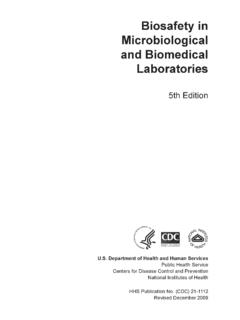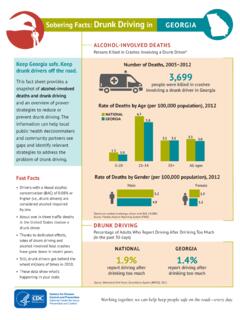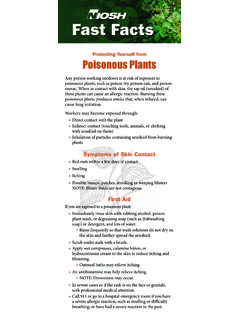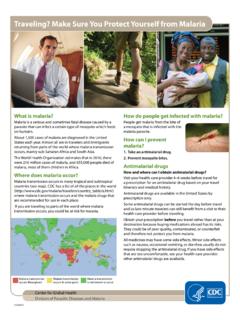Transcription of How nurses can help. The Surgeon general's call to action ...
1 How nurses Can HelpThe Surgeon General s Call to action to support BreastfeedingAcross the United States, most new mothers hope to breastfeed. breastfeeding protects the health of babies and their mothers. Leading health organizations* agree that most babies should have only breast milk for the first 6 months of life and continue breastfeeding for at least 12 months. With support from their families and communities, as well as from nurses , mothers are more likely to be able to breastfeed their You Can Help Mothers BreastfeedFind ways to learn more about breastfeeding . You may need to talk with new mothers about how important it is to breastfeed and teach them how to do it. Most nursing schools do not teach enough about breastfeeding . Look for ways to get more professional training, such as continuing education on how to help mothers breastfeed.
2 Talk with mothers. As a nurse, you can help mothers decide how to feed their babies. Mothers may not know that breastfeeding can protect them and their babies from some health risks. You can talk with pregnant women about what to expect and encourage them to ask for help with any problems. Make support for breastfeeding part of standard care. Clinical care practices can make it easier or harder for mothers to start and keep breastfeeding . For example, placing a healthy newborn in skin-to-skin contact with the mother rather than on an infant warmer and keeping the baby in the mother s room at the hospital both help mothers to breastfeed more easily. On the other hand, giving gift packs with infant formula samples to breastfeeding mothers can hinder successful breastfeeding .
3 Develop teams to give mothers the skilled care they need. If mothers have trouble breastfeeding , they may need assistance from a health care team that includes professionals with special training in this area, such as an International Board Certified Lactation Consultant. IBCLCs have clinical experience and training in how to solve breastfeeding mothers for help after they leave the hospital. If mothers get the support they need in the first 4 weeks of a new baby s life, they are more likely to keep breastfeeding . Mothers may need help finding people who are trained to help with breastfeeding problems after they leave the hospital. Without help, some new mothers may stop breastfeeding .* Includes the American Academy of Pediatrics, American Academy of Family Physicians, American College of Obstetricians and Gynecologists, American College of Nurse-Midwives, American Dietetic Association, and American Public Health You Can Take action support and help mothers who want to breastfeed.
4 As a nurse, you can be part of national efforts to support breastfeeding . Promote changes to health care systems that make it easier for women to start and keep breastfeeding . Make sure that breastfeeding is promoted and supported at every visit to a hospital, clinic, or doctor s office. Take part in writing health care standards, putting policies in place, and displaying leadership that supports mothers who want to breastfeed. Look at the selected actions recommended by the Surgeon General (see next page) to make support for breastfeeding part of all mother-baby care. By taking these actions, you can help improve the health of breastfeeding mothers and their the Surgeon GeneralSelected Actions for nurses to support BreastfeedingPatient SupportAction 1.
5 Give mothers the support they need to breastfeed their babies. Help pregnant women to learn about the importance of breastfeeding for their babies and themselves. Teach mothers to breastfeed. Encourage mothers to talk to their maternity care providers about plans to breastfeed. support mothers to have time and flexibility to breastfeed. Encourage mothers to ask for help with breastfeeding when from Hospital to CommunityAction 8. Develop systems to guarantee continuity of skilled support for lactation between hospitals and health care settings in the community. Create comprehensive statewide networks for home- or clinic-based follow-up care to be provided to every newborn in the state. Establish partnerships for integrated and continuous follow-up care after discharge from the hospital.
6 Establish and implement policies and programs to ensure that participants in WIC (Supplemental Nutrition Program for Women, Infants, and Children) have services in place before discharge from the and Skills action 9. Provide education and training in breastfeeding for all health professionals who care for women and children. Improve the breastfeeding content in undergraduate and graduate education and training for health professionals. Establish and incorporate minimum requirements for competency in lactation care into health professional credentialing, licensing, and certification processes. Increase opportunities for continuing education on the management of lactation to ensure the maintenance of minimum competencies and skills. Quality Clinical Care action 10.
7 Include basic support for breastfeeding as a standard of care for midwives, obstetricians, family physicians, nurse practitioners, and pediatricians. Define standards for clinical practice that will ensure continuity of care for pregnant women and mother-baby pairs in the first 4 weeks of life. Conduct analyses and disseminate their findings on the comparative effectiveness of different models for integrating skilled lactation support into settings where midwives, obstetricians, family physicians, nurse practitioners, and pediatricians Care Teams action 11: Ensure access to services provided by International Board Certified Lactation Consultants. Include support for lactation as an essential medical service for pregnant women, breastfeeding mothers, and children.
8 Provide reimbursement for certified lactation consultants independent of their having other professional certification or licensure. Work to increase the number of racial and ethnic minority certified lactation consultants to better mirror the more information, see The Surgeon General s Call to action to support breastfeeding at
















